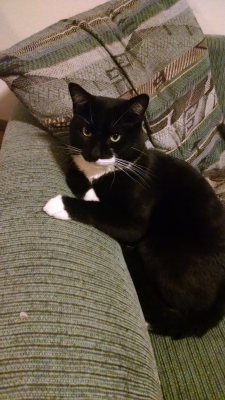
Feline Immunodeficiency Virus
FiV (feline immunodeficiency virus) is the most common disease among the cats in Silver Cloud care. Sadly, there is still a lot of misinformation and fear about this disease. Many vets, rescues, and shelters still believe the disease to be a reason to euthanize a cat immediately if there is a positive Snap/Elisa/Combo test result.
How to Test for FiV
Let’s start with the test itself. The most common, and most inexpensive and fastest test for FiV is the Snap test – also referred to as an Elisa test or a Combo test. This test can be performed in the vet’s office or shelter and results are ready in about 15 minutes. The problem with the Snap test is that it only determines if the cat has antibodies to the virus. It does not indicate whether or not the cat is actually infected with the virus. Cats can have antibodies from being exposed to the virus – including in the form of immunization. Kittens can also carry antibodies received from their mothers. In some cases a cat may be exposed to the virus and their body is able to fight it off, leaving antibodies behind. Cats can, and often do, have antibodies without having the disease. For this reason, further testing using a more accurate method is recommended.
At Silver Cloud, all positive snap test results are followed up with PCR tests. PCR tests determine if the cat has the actual virus, as opposed to antibodies to the virus.
How do Cats Get FiV?
Now that we’ve covered testing, let’s move on to transmission of the virus. FiV is spread primarily through deep puncturing bites. We’re talking about the kind that truly penetrate through the skin and tissue, allowing the infected cat’s saliva to freely mix with the blood of the bitten cat. Bites from play and typical spats between cohabiting felines will not spread FiV.
The second most common form of transmission is through the act of mating.
FiV is not spread through shared litter boxes, food and water dishes, mutual grooming, shared bedding, or any other casual contact.
Let’s recap: If your cats get along, do not tear each other to pieces, and are spayed/neutered there is little to no risk of a positive cat spreading the virus to a negative cat. Many families successfully keep positive and negative kitties together for years, and documented reports of transmission are extremely rare.
How to Help Your Cat
As the name suggests, cats with FiV can have a weak immune system. They’re more susceptible to infections and illnesses than a negative cat. Being aware of your cat’s general health and acting quickly at the first sign of illness are key to helping your positive kitty live a long, healthy life. Positive kitties are more likely to become extremely ill very quickly once an infection has taken hold. For this reason, we recommend a vet visit at the first sign of illness.
A good, healthy diet is important to help them maintain their health. I recommend a high quality food with an emphasis on wet food. Silver Cloud FiV kitties are fed Wellness brand wet food twice a day and they free feed Wellness Core dry food.
Our positive kitties are also given healthy supplements to help boost their immune system. GNC Multivitamins and Supergreens Plus Catnip are our favorites. We also give L-Lysine to our positive kitties daily.
A cat with FiV can live a long, healthy, and happy life with just a little extra care. They often match the life span of cats who do not have the virus.
Please feel free to Contact Us if you have questions about caring for an FiV positive kitty.
Permission to share and/or repost this article is freely given to all individuals, animal rescue groups, and related organizations for the purpose of education.